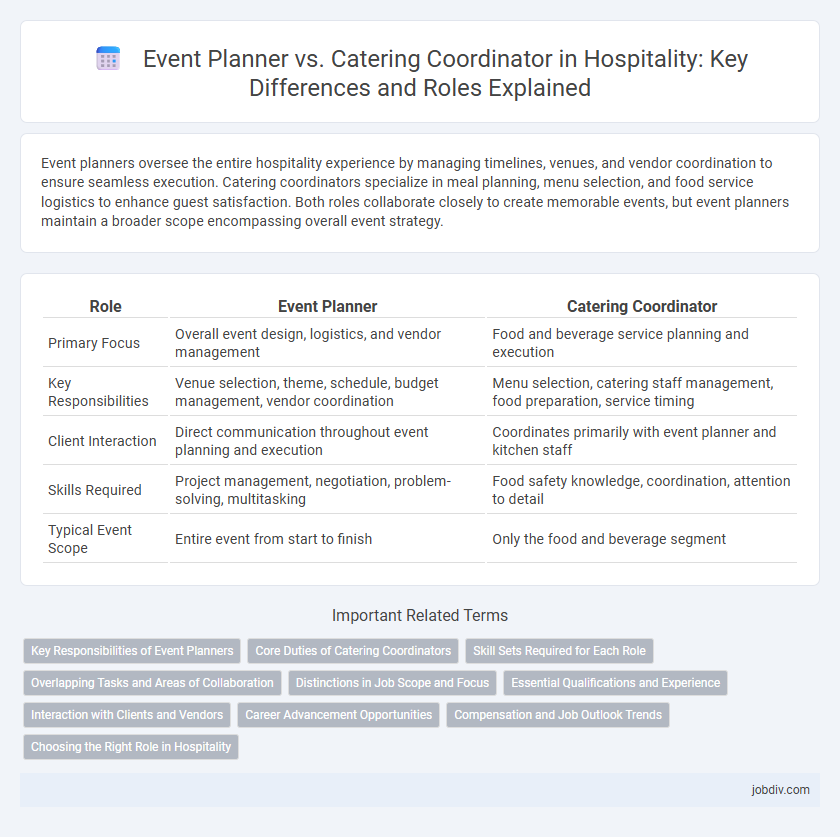Event planners oversee the entire hospitality experience by managing timelines, venues, and vendor coordination to ensure seamless execution. Catering coordinators specialize in meal planning, menu selection, and food service logistics to enhance guest satisfaction. Both roles collaborate closely to create memorable events, but event planners maintain a broader scope encompassing overall event strategy.
Table of Comparison
| Role | Event Planner | Catering Coordinator |
|---|---|---|
| Primary Focus | Overall event design, logistics, and vendor management | Food and beverage service planning and execution |
| Key Responsibilities | Venue selection, theme, schedule, budget management, vendor coordination | Menu selection, catering staff management, food preparation, service timing |
| Client Interaction | Direct communication throughout event planning and execution | Coordinates primarily with event planner and kitchen staff |
| Skills Required | Project management, negotiation, problem-solving, multitasking | Food safety knowledge, coordination, attention to detail |
| Typical Event Scope | Entire event from start to finish | Only the food and beverage segment |
Key Responsibilities of Event Planners
Event planners coordinate all aspects of hospitality events, managing logistics such as venue selection, vendor negotiations, and timeline creation to ensure seamless execution. They oversee budgeting, client communication, and on-site event management to maintain alignment with client goals and expectations. Unlike catering coordinators who focus mainly on food and beverage services, event planners handle comprehensive event strategy and operational oversight.
Core Duties of Catering Coordinators
Catering coordinators manage all food and beverage logistics, ensuring timely delivery, menu customization, and adherence to dietary restrictions. They coordinate directly with chefs, venue staff, and service teams to maintain quality and presentation standards throughout the event. Their role also includes handling inventory, staffing schedules, and client communication to guarantee seamless catering execution.
Skill Sets Required for Each Role
Event planners require strong project management skills, exceptional communication abilities, and proficiency in budgeting and vendor negotiation to coordinate all event aspects from conception to execution. Catering coordinators need in-depth knowledge of food and beverage service, expertise in menu planning, and the ability to manage kitchen staff and logistics to ensure timely and high-quality catering delivery. Both roles demand excellent organizational skills and attention to detail, but event planners focus more on overall event flow while catering coordinators concentrate on culinary operations.
Overlapping Tasks and Areas of Collaboration
Event planners and catering coordinators share overlapping tasks such as venue selection, menu planning, and timeline coordination to ensure seamless event execution. Both professionals collaborate closely to align food service with event schedules, managing guest needs and vendor communication efficiently. Their joint efforts enhance overall guest experience by synchronizing logistical details and culinary services.
Distinctions in Job Scope and Focus
Event planners oversee the entire event lifecycle, managing logistics, vendor coordination, budgeting, and client communication to ensure a cohesive experience. Catering coordinators specialize in food and beverage services, handling menu planning, kitchen operations, and staff scheduling to meet dietary requirements and event themes. While event planners maintain a broad scope covering venue and guest management, catering coordinators concentrate specifically on culinary execution and service quality.
Essential Qualifications and Experience
Event planners require strong project management skills, with experience organizing large-scale conferences and social gatherings, ensuring seamless coordination of venues, vendors, and timelines. Catering coordinators must have in-depth knowledge of food service operations, including menu planning, dietary accommodations, and staff supervision, typically gained through hands-on experience in restaurant or banquet settings. Both roles demand excellent communication abilities, attention to detail, and the capacity to troubleshoot issues under pressure.
Interaction with Clients and Vendors
Event planners maintain comprehensive communication with clients to tailor event details, ensuring alignment with their vision while coordinating with multiple vendors to secure services and manage timelines efficiently. Catering coordinators focus specifically on client preferences related to menu selection and dietary requirements, working closely with food service vendors to guarantee quality and timely delivery. Both roles demand strong interpersonal skills but differ in scope, with event planners overseeing broader logistics and catering coordinators specializing in food and beverage coordination.
Career Advancement Opportunities
Event planners often experience broader career advancement opportunities by managing entire event logistics, client relations, and strategic planning, which can lead to senior roles such as Director of Events or Event Marketing Manager. Catering coordinators typically specialize in food service operations within events, progressing toward positions like Catering Manager or Banquet Director that focus on culinary and service excellence. Both roles require strong organizational and interpersonal skills, but event planners generally have greater upward mobility in diverse sectors of the hospitality industry.
Compensation and Job Outlook Trends
Event planners generally earn a higher median salary, ranging from $50,000 to $70,000 annually, reflecting their broader responsibilities in managing entire events, while catering coordinators typically earn between $35,000 and $55,000 due to their specialized focus on food and beverage services. The job outlook for event planners is projected to grow by 11% over the next decade, driven by increasing demand for corporate and social events, whereas catering coordinators have a steadier growth rate of around 5%, closely tied to the hospitality and food service industries. Both roles benefit from seasonal spikes but event planners experience greater volatility linked to economic cycles affecting large-scale event budgets.
Choosing the Right Role in Hospitality
Event planners oversee the entire event lifecycle, managing logistics, budgeting, and client communication to ensure a seamless experience, while catering coordinators specialize in menu planning, food service, and coordination with kitchen staff to deliver exceptional dining. Selecting the right role depends on whether your strengths lie in broad organizational skills and vendor management or in detailed food and beverage execution. Hospitality professionals aiming for comprehensive event management often pursue event planning, whereas those passionate about culinary service excellence excel as catering coordinators.
Event Planner vs Catering Coordinator Infographic

 jobdiv.com
jobdiv.com